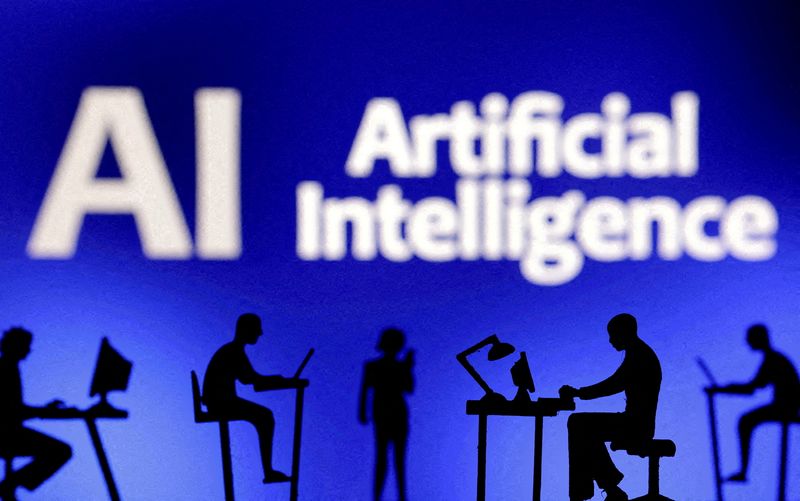Investing.com - A number of high-profile software companies offered up weak forward-looking guidance during the last quarter’s earnings season, but Goldman Sachs (NYSE:GS) has advised investors not to rule the sector out of the excitement surrounding Gen-AI.
The influential investment bank noted the unusual strength in fourth-quarter results of 2023 for several software companies coinciding with expectations for rate cuts and slowing inflation. Those expectations changed very sharply in the first quarter of 2024.
Oracle (NYSE:ORCL) and Adobe (NASDAQ:ADBE) offered up reasonably healthy numbers last week, but the likes of Snowflake (NYSE:SNOW) recently forecast disappointing first-quarter product revenue on expectations that customers would cut back on spending in an uncertain economy.
This news came despite accelerating hyperscaler growth, raising the question of whether the issues driving weaker demand are cyclical or structural.
Hyperscalers are large cloud service providers, which can provide services such as computing and storage at enterprise scale, and include the likes of Microsoft (NASDAQ:MSFT), Alphabet’s (NASDAQ:GOOGL) Google and Meta Platforms (NASDAQ:META).
The divergence between hyperscaler acceleration and deceleration in enterprise software has been notable, said analysts at Goldman Sachs said, in a note dated June 3, as the hyperscalers have been able to invest considerable amounts of incremental capital in order to generate revenues from generative artificial intelligence (Gen-AI).
“We estimate the incremental capital spending above regular cloud CapEx to be in the annual run rate of $60 to $80 billion. This has driven an estimated incremental Gen-AI related revenues in the $14 to $16 billion range,” Goldman said.
The global software industry is now pushing $700 billion and is one of the largest capital spending items, if not the largest, which makes it susceptible to high cost of capital.
There is a reasonable case to be made that new AI priorities have pushed aside consideration for more mature well-established spending items, the bank added. Software has always been about productivity and now a cognition aspect has been added, which changes the value proposition and sales cycles as a result.
This raises the question whether hardware is finally disrupting software, after software dominated for much of the last decade.
To answer this, Goldman pointed out that tech cycles tend to follow a pattern - at first, the cycle is about infrastructure build out. Then there are platforms that allow the best use of that infrastructure, while providing building blocks to build next generation applications, and the final leg is the build out of applications.
“In order for any tech cycle to be successful, there has to be a killer application,” Goldman said, citing enterprise resource planning in the late 90s, search and e-commerce during the dot-com bubble, and cloud applications following the Great Financial Crisis."
“In each of these cycles the value creation started with the infrastructure layer and moved to platforms and applications,” Goldman said. “In the case of generative AI, we are still waiting for a killer application or a few that can produce results at scale for different end user domains, be it front office, middle office or back office.”
While the pace of Gen-AI technology continues to evolve, it is not quite to the point where the killer applications are obvious today.
A big difference in this cycle of generative AI is that while the incumbents in the prior client server cycle were slow to adopt the cloud, the application software incumbents in this cycle, be it Salesforce (NYSE:CRM), SAP (ETR:SAPG), Oracle, ServiceNow (NYSE:NOW), Adobe, Intuit (NASDAQ:INTU) or Workday (NASDAQ:WDAY), are developing Gen-AI products with a heightened sense of urgency.
Additionally, data will be a critical element for the success for an AI company, and the data incumbency advantage enjoyed by companies like Salesforce, Adobe, Intuit, ServiceNow, and Snowflake cannot be taken too lightly.
Application software companies are trading at cyclically depressed valuation multiples, the bank said, and it is a concerning time.
“We do believe that in the short-term, the cyclical aspect of higher rates, if alleviated, will cause buying cycles to ease up and therefore the demand picture for the group should get better in the subsequent quarters,” Goldman Sachs said.
The companies that take generative AI technology architectures more seriously and are open to the thorough examination and re-architecting of their platforms will end up being successful.
After all, a surprising amount of the shareholder value creation from 2010 to 2020 came from incumbent software companies such as Adobe, Microsoft, Intuit, and Autodesk (NASDAQ:ADSK), who embraced the changing technology and business models much to the surprise of investors.
